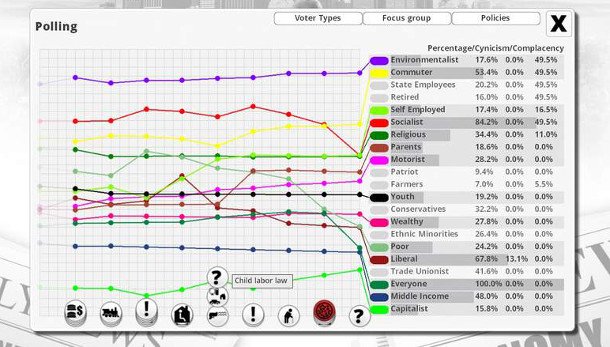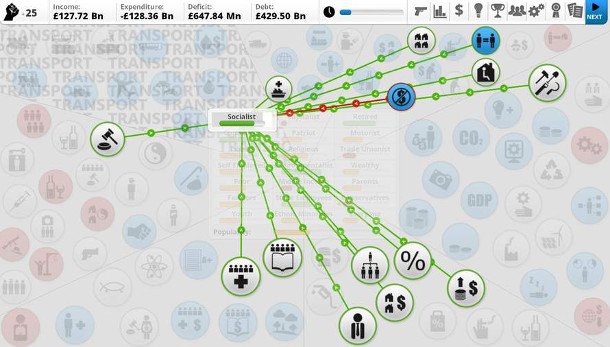Democracy 3 hands on: losing elections with land mines in a complex politics sim

The emphasis on intelligence leads back to the icon interface – individual policy or problem bubbles connected to related bubbles. It's reminiscent of neurons connecting different parts of the brain. In fact, the brain's structure is the starting point for the whole Democracy series.
“I was reading a book by Steve Grand, the guy who did the Creatures games, and he started this project where he was going to build a robot chimpanzee. He wrote a book about it called Growing Up With Lucy. There was a big discussion in this book about how your brain works, and how therefore he was going to get this chimpanzee brain to work. In some weird bolt out of the blue, I suddenly thought, 'You could model economics and politics like that.' That's what the code is – a neural network.”
Having programmed a brain in order to model politics, you'd want to know how accurate it was. Turns out, that's a concept that is incredibly hard to research. There's also the realworld possibility that the same policies implemented in two different countries would lead to very different results. The upshot is that Democracy 3 has a system of overrides so you can customise every policy and every equation, tweaking your chosen country until it feels right.
One way of thinking of it is that each game is a mod; you just happen to have started off with Harris's preferred and playtested version. Obviously that means it's easier to cheat, but if you're playing Democracy, chances are it's not because you're looking for something that lets you stomp to victory. There is no real victory condition, just longevity.
The inevitable question with a game like Democracy is that of inherent bias – of Harris seeding his own worldview throughout the game. “Hopefully there's no inherent bias. I know that's ridiculous,” he says. “When I playtest it, [I do] it with loads of philosophies. Communist, UKIP, Libertarian – I check that I don't feel like the odds are stacked against me. I'm not so bothered if that strategy ultimately fails or seems a bit easier. If, when I'm in that mindset, I think 'this is ridiculous, why is that happening?,' then I would tweak that. I really haven't had any feedback from people saying it's obviously biased.”
Later in the conversation, the subject of electioneering comes up – cheap shots at Prime Minister's Questions, queuing for sausage rolls outside Greggs to score voter points, kissing babies. Harris explains that elections in Democracy 3 are like “elections in paradise. Everyone in the game is a rational actor. They're always thinking, 'Do I agree with this?' They never think this politician's really funny or he's a bit shifty.”

“You're such an economist,” I tell him. He laughs: “I've provided a worldview where political debate and argument wins.” It's a political game without a Boris Johnson mode. There's no 'go down well with viewers as a host on Have I Got News For You' option. This, I think, is Harris's inherent bias. He dislikes the manipulative, media-focused aspects of politics, and therefore his games model a world in which people make rational choices based on sensible criteria. It's a weakness when it comes to making the game seem realistic on a daily news level, but it doesn't prevent the underlying systems from providing a strong model for the relationships between policies and outcomes.
The biggest gaming news, reviews and hardware deals
Keep up to date with the most important stories and the best deals, as picked by the PC Gamer team.
A nod to Democracy's strength is the fact the US Department of Defense was interested in using the software. “They wanted some kind of software to model US involvement in the Middle East, specifically Iraq and Afghanistan, to see how they could model non-violent resolutions to problems. If we invest money in a better water supply for this part of Iraq, is that going to reduce terrorist activity or threats?” It's also used in schools and as part of management training. The Yemeni government previously asked for the software to be translated into Arabic.
Given the demand for modelling international politics, I ask what's next. Harris was, at one point, working on a dictatorship sim but it turned into Gratuitous Space Battles. After Democracy 3 will come Gratuitous Space Battles 2, but after that the dictatorship sim might be back on the cards. “There was a lot of talk that Saddam [Hussein] had to be quite cruel and brutal because beneath him you had generals who, if you showed weakness, would kill you and take over,” he explains.
“It's probably quite hard to manage that. At some point the people will rise up or the generals will overthrow me or the UN will come in. Or, worst case, we strike oil and the Americans will come in and 'liberate' us. There's a very interesting strategy game that's an evil dictator just trying to walk that line.”

